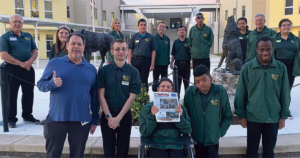
As people spend more of their time working, shopping and socializing online, they’re risking real-life consequences to their financial, professional and even personal well being. That’s the message that a group of experts delivered on Oct. 11 during a recent cybersecurity symposium at the Pasco Hernando State College (PHSC) Porter Campus at Wiregrass Ranch in Wesley Chapel.
Speakers presented information about protecting yourself from identity theft and social media risks, as well as about internet-based crimes such as human trafficking. The event was co-hosted with the Florida Center for Cybersecurity (FCC) at the University of South Florida (USF) and is part of PHSC’s Community Awareness Series.
Keynote speaker Sri Sridharan, the managing director of USF FCC, told the audience that cybertheft of consumers’ financial information and money has become so common that it is usually unreported by the media and not investigated by law enforcement.
“Just because you don’t hear about it doesn’t mean the problem isn’t there,” Sridharan said, adding that identity thieves target public Wi-Fi networks such as those made available by coffee shops, restaurants and stores to intercept personal information from people using those networks.
Another trend, called ransomware, allows hackers to encrypt information on a computer or data network, preventing users from accessing their files. Users regain access by paying money to the hackers. Sridharan said one way people can avoid identity theft is taking personal responsibility for online behavior.
“Cybersecurity is a serious problem and people have to practice good cybersecurity ‘hygiene’ to protect their personal information,” he said.
Using complex passwords that are unique to each login, shopping at well-known commercial websites, not using unknown USB drives or memory cards you’ve found laying around and becoming savvy about malicious links in emails and websites are some of Sridharan’s suggestions for maintaining your online security.
Dumpster diving (going through people’s garbage looking for discarded documents with personal information on them), shoulder surfing (peering over someone’s shoulder to steal a password or PIN) and skimming (a small device that scans your credit card when it’s inserted at the gas station, ATM or other automatic money machine) may sound like extreme sporting activities but they’re actually some of the common techniques used by identity thieves according to Jeff House, associate director of PHSC network services, who also spoke during the symposium.
“The main thing is being aware that the technologies we take for granted can easily cause us to lose our identities,” House said.
He recommends shredding sensitive documents before discarding them, positioning yourself away from the prying eyes of people around you when working online or using bank cards in public and taking a good look at point of sale terminals at registers and gas pumps to see if they appear to have been altered with information-stealing skimmers.
Social Security Protection
Staking out your Social Security account online long before claiming your benefits was the advice from Daryl Rosenthal, a public affairs specialist from the Social Security Administration. He says going online to SocialSecurity.gov and creating your account (called “my Social Security account”) allows you to review your earnings history for accuracy, learn about benefits and keep someone else from accessing your account and stealing your benefits. Rosenthal said it’s not easy for someone else to access your account, but it can happen if they acquire enough personal information about you. “To get an account, you have to enter information you know about yourself beyond your Social Security number,” he said.
Rosenthal also advises that people shouldn’t routinely carry their Social Security cards with them, and that they should resist providing their Social Security number to businesses that request it.
The internet has become a virtual playground and shopping center and Corporal Alan Wilkett of the Pasco County Sheriff’s Office (PCSO) says there’s a dark side to that activity, with human trafficking taking place online. He says the practice of human trafficking involves economic slavery, body organ harvesting and the sex trade.
“The auctions of people are taking place online and it’s one of the most diabolical things around,” Cpl. Wilkett said. “Most of the adults I talk to have no idea this is going on.” According to Cpl. Wilkett, the best way to combat human trafficking is increasing public awareness of the problem and a willingness to get involved.
Bullying is the topic for PHSC’s next Community Awareness Series event, which will take place Wednesday, November 16, 2 p.m.-3 p.m. It will be held in the Building B conference room of the Porter Campus, located at 2727 Mansfield Blvd. For more information, you can visit PHSC.edu or call 527-6629.




No comment yet, add your voice below!